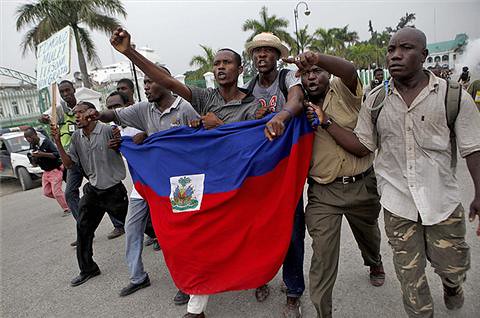
Haitians demonstrate against the United Nations forces still operating inside the country. Haiti has been devastated by a coup in February 2004 and a recent earthquake on January 12, 2010., a photo by Pan-African News Wire File Photos on Flickr.
Four years after devastating earthquake, Haitians get nothing but imperialist occupation
By G. Dunkel on January 14, 2014
Workers World
The horrific Jan. 12, 2010, earthquake in Haiti caused building collapses in Port-au-Prince and its suburbs that killed at least 300,000 people. It left an uncounted number injured and 1.5 million homeless.
Four years later, according to the Ministry of Public Works, an estimated 20 percent of the ruble has yet to be removed. Only 7,515 units of public housing have been built and what has been built suffers from major shortcomings. (Haiti Grassroots Watch, Jan. 8)
The massive devastation of Haiti touched off a worldwide outpouring of sympathy and solidarity. Governments promised $14 billion in aid. However, not much has substantially improved in the lives of the Haitian people.
The U.S. government put together an aid package worth $128 million to build an industrial park in Caracol on the northwest coast of Haiti that was supposed to supply 60,000 jobs. (Le Monde Diplomatique, May 2013) At the end of 2013, only 2,590 people were working there and many of them weren’t paid even Haiti’s minimum wage of $4.54 a day. (New York Times, Jan. 10)
The second week of December 2013 saw a nationally coordinated wave of strikes and protests that at times brought out tens of thousand of workers into the streets of Port-au-Prince, Ouanaminthe and Caracol. The aim of the movement was to raise the minimum wage to $11 a day. The unions involved picked the busiest time of the year to strike.
The bosses retaliated when workers came back from their Christmas vacations. Jude Pierre, Luckner Louis, Deroy Jean Baptiste, Paul René Pierre, Jean Luvard Exavier and Rubin Mucial — all members of the Textile and Clothing Workers (SOTA) executive board — were fired on Jan. 8 from One World Apparel. SOTA intends to vigorously protest this illegal and unjust termination. (AlterPresse, Jan. 9)
Two positions on what happened
Both the New York Times of Jan. 10 and Haїti-Liberté of Jan. 8-14 wrote editorials summing up their positions on what has happened in Haiti since the earthquake.
The Times, the leading liberal bourgeois daily in the United States, calls for the U.S. government to “stick to its commitments to Haiti, with a particular focus on … building the capacity of the Haitian government.” The Times finds some hopeful signs: more students are in school and cholera deaths are down, although Haiti still records over half the cholera cases in the world. But, it adds, “Haiti is a fragile, largely forgotten country.”
It also comments that “we” don’t have a good idea of how the aid provided to Haiti — most of which doesn’t go to the Haitian government — is spent. Could the Times be in part criticizing itself? It published only two articles in 2013 on events in Haiti.
What the Times doesn’t acknowledge is that the U.N. military occupation, called Minustah, really calls the shots in Haiti and that its support is essential in keeping the Michel Martelly government in power. And it was the U.S. and France, both members of the U.N. Security Council that created Minustah, which along with Canada supported Martelly’s decision to keep the popular and progressive Fanmi Lavalas party of Jean-Paul Aristide off the ballot. The direct intervention of Bill Clinton and Hillary Rodham Clinton kept Martelly on the ballot.
Haïtí-Liberté is the largest circulation weekly in Haiti and its diaspora. It is written mostly in French but has one page in English and another in Creole. Its columns are open to progressive voices from community groups and unions in Haiti.
Berthony Dupont, who wrote the editorial, says, “Nothing serious or useful has been tried to get us out of our morass, despite all the hullabaloo and verbiage about the promises made around a fictitious reconstruction.”
He goes on, “The earthquake of Jan. 12 quite simply served as a pretext for the International Community to accelerate its neoliberal program and to reinforce its occupation of the country.” That’s why the aid didn’t go to serve the needs of people but rather to enrich “the oligarchy and the anti-people government of Martelly.”
He explains, “The slave owners, today the imperialists, have never forgiven Haiti for beating the most powerful army in the world and have not ceased to destabilize it, not only to reconquer it but also to punish it for irreversibly putting an end to colonialism based on slavery.
“To escape this straitjacket, we have only one choice, drive all the imperialists from our shores,” DuPont concludes. He singles out the U.S. government as the most aggressive and powerful.
No comments:
Post a Comment